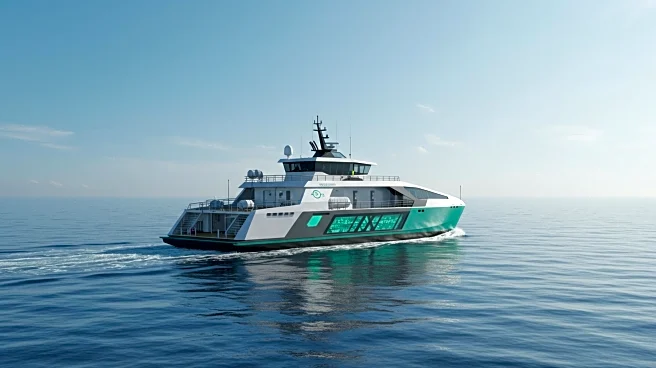What's Happening?
Fleetzero, a prominent developer of modular propulsion platforms for hybrid and electric ships, has partnered with Glosten, a naval architecture and marine engineering firm, to design what is anticipated to be the world's longest-range hybrid electric vessel. This collaboration aims to advance zero-emission global shipping and expand the use of electric propulsion in commercial maritime applications. The project involves retrofitting a Lightering Support Vessel owned by AET with a plug-in hybrid-electric propulsion system, allowing it to operate primarily on battery power. Steven Henderson, CEO of Fleetzero, emphasized the significance of this vessel as a milestone for the industry, showcasing the potential for cleaner and more efficient shipping operations. Morgan Fanberg, CEO & President of Glosten, expressed excitement about supporting Fleetzero in this transformative endeavor. The vessel design is underway, with detailed engineering set to commence in the coming months and construction expected to begin in mid-2026.
Why It's Important?
The development of the longest-range hybrid electric vessel represents a significant advancement in maritime technology, with potential implications for reducing emissions in the shipping industry. As global shipping accounts for a substantial portion of greenhouse gas emissions, the transition to hybrid-electric propulsion could lead to more sustainable practices and compliance with international environmental standards. This collaboration between Fleetzero and Glosten could set a precedent for other companies in the industry, encouraging further innovation and investment in clean energy solutions. The successful implementation of this technology may also influence regulatory policies, promoting the adoption of zero-emission vessels and contributing to global efforts to combat climate change.
What's Next?
With the vessel design already underway, Fleetzero and Glosten will move into detailed engineering in the coming months. Construction is expected to begin in mid-2026, with the vessel serving as a model for long-range hybrid-electric propulsion worldwide once operational. The project's progress will likely be monitored by industry stakeholders, including environmental groups and regulatory bodies, as it could influence future shipping standards and practices. The success of this initiative may lead to increased collaboration between technology developers and marine engineering firms, further advancing the adoption of sustainable shipping solutions.
Beyond the Headlines
The collaboration between Fleetzero and Glosten highlights the growing trend towards sustainable innovation in the maritime industry. This project not only addresses environmental concerns but also demonstrates the economic viability of hybrid-electric propulsion systems. As the industry faces increasing pressure to reduce its carbon footprint, such advancements could lead to a shift in cultural attitudes towards shipping, prioritizing sustainability and efficiency. Additionally, the project may inspire further research and development in related fields, such as battery technology and renewable energy integration, contributing to broader technological progress.










